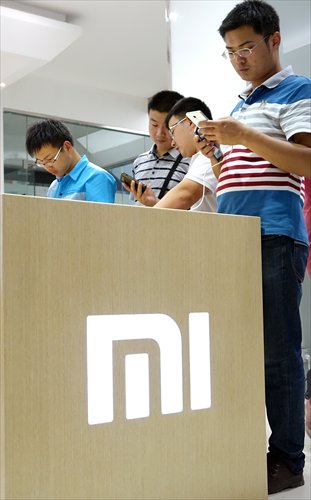Farewell to free patent pool
NDRC probe may remove protection against litigation for Xiaomi

Customers try Xiaomi smartphones at a Xiaomi store in Zhengzhou, Central China's Henan Province in September. Photo: CFP
It seems to be the right time for Beijing Xiaomi Technology Co to bump up its investment in patents, as the rising smartphone star will likely lose Qualcomm's protective umbrella against patent lawsuits by other domestic handset companies in the near future.
Despite possessing only 12 authorized patents, as shown on the site of the State Intellectual Property Office (SIPO), the four-year-old company has yet to suffer any patent litigation on its road to successfully squeezing into China's top three smartphone vendors and the world's top five by shipment.
Analysts said that this is mainly thanks to Qualcomm's patent licensing policy, ruling that phone companies which intend to use its chip products must license their own patents to the US company and cannot levy royalties on Qualcomm's clients either.
"This agreement used to benefit companies such as Xiaomi and OPPO that have few patents, saving their efforts in patent accumulation, but is widely regarded as an unfavorable contract for those who have invested a lot in the intellectual property area," Li Yi, secretary-general of the China Mobile Internet Industry Alliance, told the Global Times Tuesday.
In 2013, China's leading information and communications technology firm Huawei, poured 30.7 billion yuan ($4.99 billion) into R&D, accounting for 12.8 percent of its total income, according to the annual financial report issued by the company on its website in March.
Huawei has invested over 151 billion yuan in research over the past decade, and currently owns 22,311 authorized patents. By contrast, Guangdong-based smartphone maker OPPO only holds 11 authorized patents, according to information from the SIPO.
The unfair policy is reportedly to be abolished soon as a result of the National Development and Reform Commission's (NDRC) probe into allegations of monopolistic practices by Qualcomm, which Li noted will give more possibilities for domestic handset companies to use patents as a competitive weapon.
Wang Yanhui, head of the Shanghai-based Mobile China Alliances, expected the NDRC's investigation result to be disclosed by the end of the year, while a PR representative with Qualcomm told the Global Times Wednesday that they have no knowledge of this.
Against this backdrop, there have already been media reports stating that Huawei and ZTE have launched patent infringement lawsuits against Xiaomi, OPPO and VIVO.
A PR representative with Huawei denied the reports when contacted by the Global Times Tuesday, saying that the company has not filed any suit against domestic phone makers. But she noted that Huawei will devote itself to setting up a fair and healthy business atmosphere and highly values the protection of its intellectual property rights.
ZTE, in possession of 14,995 authorized patents, refused to give any comment on the reports when contacted by the Global Times. Xiaomi also refused to comment.
Xiaomi could have made itself an easy target by using the controversial hunger marketing technique to stimulate demand and selling low-priced smartphone models. In late September, Xiaomi's CEO Lei Jun complained on his Sina Weibo account that some Huawei senior executives have been insulting its flagship smartphone Mi4.
Li noted that royalties and compensation, if companies like ZTE and Huawei plan to make claims via legal avenues, will generate more burdens for Xiaomi than for OPPO and VIVO, as the former's profit margin is lower than that of the other two.
This is unlikely to happen in the short term and a nationwide patent litigation battle will not erupt either, at least not before any mobile phone patent cases are settled in China, remarked Wang.
However, Wang believes that patent investment is something that mobile phone companies like Xiaomi must value, or face obstacles in their overseas expansion.
In the third quarter of the year, Xiaomi jumped to third place in the world's smartphone company rankings by shipment for the first time with 5.3 percent, following Samsung (23.8 percent) and Apple (12 percent), according to IDC's October report.
If Xiaomi were to threaten the positions of Apple and Samsung, those companies would surely use their fruitful patent portfolios to drive away Xiaomi as they did to Taiwan-based phone maker HTC, said the analysts.
It seems that Xiaomi's CEO Lei Jun has already become aware of the importance of investing in patents. One of his Weibo posts in 2012 suggested his envy for Qualcomm's Patent Wall, which showed off 1,395 of its favorite patents, and hoped Xiaomi would have a wall like that some day.
Starting in the second half of 2012, Lei Jun started to make up for this shortcoming.
The company reportedly licensing a number of patents by Shanghai-based Leadcore Technology Co at the price of 103 million yuan in early November. Xiaomi refused to comment on this.
Li believes that Xiaomi's current investment in patent or R&D is insufficient, and is concerned that the potential risk of being dragged into patent suit turmoil, following the results of the investigation into Qualcomm, may dampen investors' confidence in Xiaomi.